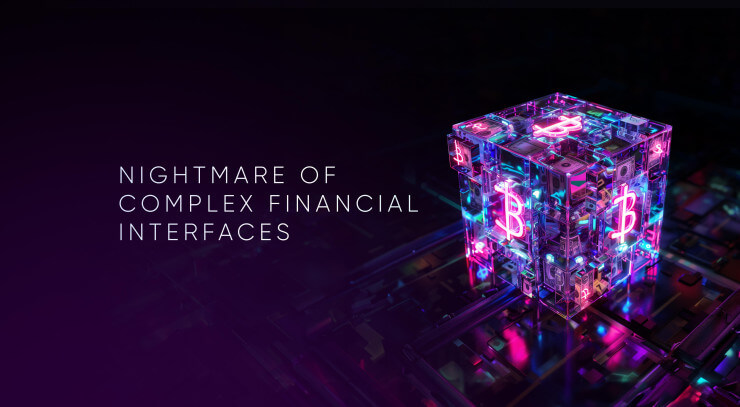What is financial UX design?
UX means user experience. So, the financial UX design definition is about engineering and designing digital financial solutions by focusing on the user experience they provide to their customers. Financial UX design practitioners believe that success of digital products in the banking industry depends on customers. That is why they use a range of user centered methods to create digital user interfaces (UI) that meet customers’ needs, and help to solve their tasks in the most simple and intuitive way.
The financial UX design cannot be separated from the financial UI design because those are the two parts of the same process: service design of financial products. The financial user experience is a part of the financial customer experience. Customer experience includes all the touch points in which the customer interacts with the financial institution, but user experience is limited only to digital solutions that are used by customers. That is why the financial benefit of improving the customer experience could be huge, and should be taken into account when planning financial UX design transformation.
Check out the best articles by UXDA about financial UX design.
Customer-Led Banking Is Reshaping Inside-Out Financial Institutions
For decades, banks were built inside-out—core systems first, then products, and only later the customer. Digital-first challengers invert this logic, starting with brand purpose and experience and building the core to serve it. This article shows how traditional banks can turn their architecture upside down to compete in the outside-in era.
Why Banks Get Blacklisted by Design Agencies—And What Leadership Misses
Partnerships with design agencies can unlock innovation for banks—but repeated “red flag” behaviors risk damaging trust. This article reveals what blacklisting really means in the design industry and why premium agencies quietly avoid difficult clients.
Financial CX as a Make-or-Break Factor in 2026 Banking Strategy
In a saturated market, product features alone no longer win hearts—or users. Financial User Experience (UX) has become the game-changer that defines product success or failure. This article uncovers how strategic UX design drives adoption, loyalty, and breakthrough growth for financial products.
Dopamine Banking: UXDA’s 10‑Year Anniversary at Digital Art House
In 2025, UXDA celebrated 10 years of transforming the financial industry through emotional user experience design, growing from a bold startup into an award-winning agency with a global impact, serving nearly 100 clients across 39 countries and millions of users worldwide.
How UXDA Redefined 150 Financial Services Through Exclusive Digital Experience Branding
Could design, often seen as an afterthought or just decoration, truly revolutionize finance? The toughest markets need the softest touch. Confident in their beliefs, Alex and Linda embarked on a mission to demonstrate that human-centered design could play a pivotal role in the financial sector.
Detecting Experience Friction Before Users Abandon Your Financial App
Too often, financial executives overlook the user experience (UX) of their apps, leading to customer frustration and churn. What if your bank’s app is a UX disaster waiting to happen? Here’s how to find out—and fix it before it’s too late.
Digital Bank Design at Scale: Constraint for Some, System for UXDA
The world of financial services is a labyrinth of complexity, regulations and high stakes. Despite the allure of high-profile projects and substantial budgets, even the most skilled designers often hesitate to delve into this demanding sector. The primary reason?
UX Case Study: a Bugatti-Caliber Experience for UHNWIs with $200 Billion in Assets
Private Wealth Systems aimed to revolutionize wealth management by delivering a user-friendly and visually stunning solution that meets the luxurious needs of multi-millionaires. Delve deeper to understand how UXDA partnered with Private Wealth Systems to facilitate a fundamental shift in wealth management.
Beyond Features: The Value Pyramid of a UX Strategy in Banking
There are 5 levels that determine the value of the product to the customer. They are associated with basic human motives derived from Maslow's hierarchy of needs.
GCash UX Case Study: Democratizing Investments for 90M Filipinos
The new and improved GInvest service was aimed to provide Filipinos with an investment opportunity that previously seemed unattainable. An experience designed by UXDA is set to transform the mindset of 90 million Filipinos, showing that investing isn't only for rich and financially savvy people.
UXDA's Brand Purpose Unleashed: Our Rebranding Journey
We are eager to share how we found a way to integrate a brand's soul into a visual identity with an elegant solution that required us to look deep into the purpose of our work.
- 1
- …
- 3






















